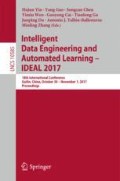Abstract
In this paper, we address a collaborative learning team formation problem in higher education environments. This problem considers a grouping criterion successfully evaluated in a wide variety of higher education courses and training programs. To solve the problem, we propose a hybrid evolutionary algorithm based on adaptive mutation and crossover processes. The behavior of these processes is adaptive according to the diversity of the evolutionary algorithm population. These processes are meant to enhance the evolutionary search. The performance of the hybrid evolutionary algorithm is evaluated on ten different data sets, and then, is compared with that of the best algorithm previously proposed in the literature for the addressed problem. The obtained results indicate that the hybrid evolutionary algorithm considerably outperforms the previous algorithm.
Access this chapter
Tax calculation will be finalised at checkout
Purchases are for personal use only
References
Barkley, E.F., Cross, K.P., Howell Major, C.: Collaborative Learning Techniques. Wiley, New York (2005)
Michaelsen, L.K., Knight, A.B., Fink, L.D.: Team-Based Learning: A Transformative Use of Small Groups in College Teaching. Stylus Publishing, Sterling (2004)
Belbin, R.M.: Team Roles at Work, 2nd edn. Taylor & Francis, London (2011)
Alberola, J., Del Val, E., Sanchez-Anguix, V., Palomares, A., Teruel, M.: An artificial intelligence tool for heterogeneous team formation in the classroom. Knowl.-Based Syst. 101(1), 1–14 (2016)
Yannibelli, V., Amandi, A.: A deterministic crowding evolutionary algorithm to form learning teams in a collaborative learning context. Expert Syst. Appl. 39(10), 8584–8592 (2012)
Eiben, A.E., Smith, J.E.: Introduction to Evolutionary Computing, 2nd edn. Springer, Heidelberg (2015)
Srinivas, M., Patnaik, L.M.: Adaptive probabilities of crossover and mutation in genetic algorithms. IEEE Trans. Syst. Man Cybern. 24(4), 656–667 (1994)
Yannibelli, V., Amandi, A.: A Hybrid Algorithm Combining an Evolutionary Algorithm and a Simulated Annealing Algorithm to Solve a Collaborative Learning Team Building Problem. In: Pan, J.-S., Polycarpou, Marios M., Woźniak, M., de Carvalho, A.C.P.L.F., Quintián, H., Corchado, E. (eds.) HAIS 2013. LNCS, vol. 8073, pp. 376–389. Springer, Heidelberg (2013). doi:10.1007/978-3-642-40846-5_38
Yannibelli, V., Amandi, A.: A Memetic Algorithm for Collaborative Learning Team Formation in the Context of Software Engineering Courses. In: Cipolla-Ficarra, F., Veltman, K., Verber, D., Cipolla-Ficarra, M., Kammüller, F. (eds.) ADNTIIC 2011. LNCS, vol. 7547, pp. 92–103. Springer, Heidelberg (2012). doi:10.1007/978-3-642-34010-9_9
Cruz, W.M., Isotani, S.: Group Formation Algorithms in Collaborative Learning Contexts: A Systematic Mapping of the Literature. In: Baloian, N., Burstein, F., Ogata, H., Santoro, F., Zurita, G. (eds.) CRIWG 2014. LNCS, vol. 8658, pp. 199–214. Springer, Cham (2014). doi:10.1007/978-3-319-10166-8_18
Ounnas, A., Davis, H.C., Millard, D.E.: A framework for semantic group formation in education. Educational Tech. Soc. 12(4), 43–55 (2009)
Rodriguez, F.J., García-Martínez, C., Lozano, M.: Hybrid metaheuristics based on evolutionary algorithms and simulated annealing: taxonomy, comparison, and synergy test. IEEE Trans. Evol. Comput. 16(6), 787–800 (2012)
Talbi, E. (ed.): Hybrid Metaheuristics. SCI, vol. 434. Springer, Heidelberg (2013)
Author information
Authors and Affiliations
Corresponding author
Editor information
Editors and Affiliations
Rights and permissions
Copyright information
© 2017 Springer International Publishing AG
About this paper
Cite this paper
Yannibelli, V., Amandi, A. (2017). A Hybrid Evolutionary Algorithm based on Adaptive Mutation and Crossover for Collaborative Learning Team Formation in Higher Education. In: Yin, H., et al. Intelligent Data Engineering and Automated Learning – IDEAL 2017. IDEAL 2017. Lecture Notes in Computer Science(), vol 10585. Springer, Cham. https://doi.org/10.1007/978-3-319-68935-7_38
Download citation
DOI: https://doi.org/10.1007/978-3-319-68935-7_38
Published:
Publisher Name: Springer, Cham
Print ISBN: 978-3-319-68934-0
Online ISBN: 978-3-319-68935-7
eBook Packages: Computer ScienceComputer Science (R0)

